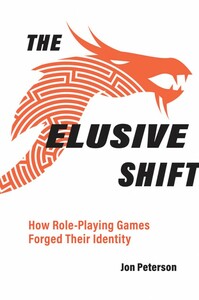Take a photo of a barcode or cover
challenging
informative
relaxing
medium-paced
Really interesting coverage of the subject matter. Lots of new information and I left wanting to read more about early dnd and seek out the articles referenced. However the book uses a lot of quotes expecting you do remember what the people who said them and I found it difficult to keep track of who thought what.
challenging
informative
inspiring
slow-paced
The Elusive Shift es un extenso ensayo sobre el origen y la evolución de los juegos de rol de fantasía, escrito por John Peterson y publicado en 2020.
A lo largo de sus páginas, Peterson traza una historia detallada sobre cómo los juegos de rol emergen como un sincretismo entre los wargames y la efervescente escena de ciencia ficción de los años 70. Con el apoyo de una enorme cantidad de documentación original —cartas, fanzines, manuales— y una argumentación precisa, el autor construye una narrativa en torno a un puñado de jugadores que, mientras juegan, redefinen las fronteras del medio.
Aunque el tema resulta fascinante, el ensayo es académico tanto en estilo como en propósito. Está bien escrito, sin duda, y su objeto de estudio puede parecer ligero, pero su desarrollo es denso, minucioso, y avanza con una lentitud que pone a prueba la paciencia. La argumentación, por necesidad, vuelve sobre los mismos puntos en varias ocasiones, lo que contribuye a una sensación de reiteración que puede hacerlo árido en tramos largos.
En conjunto, The Elusive Shift es una lectura interesante y, por momentos, apasionante. Exige cierta perseverancia y capacidad de abstracción, pero quienes consigan superar su aridez se verán recompensados con una visión rica, documentada y profundamente reflexiva sobre el nacimiento de un medio que hoy consideramos común pero que, en su día, fue revolucionario.
A lo largo de sus páginas, Peterson traza una historia detallada sobre cómo los juegos de rol emergen como un sincretismo entre los wargames y la efervescente escena de ciencia ficción de los años 70. Con el apoyo de una enorme cantidad de documentación original —cartas, fanzines, manuales— y una argumentación precisa, el autor construye una narrativa en torno a un puñado de jugadores que, mientras juegan, redefinen las fronteras del medio.
Aunque el tema resulta fascinante, el ensayo es académico tanto en estilo como en propósito. Está bien escrito, sin duda, y su objeto de estudio puede parecer ligero, pero su desarrollo es denso, minucioso, y avanza con una lentitud que pone a prueba la paciencia. La argumentación, por necesidad, vuelve sobre los mismos puntos en varias ocasiones, lo que contribuye a una sensación de reiteración que puede hacerlo árido en tramos largos.
En conjunto, The Elusive Shift es una lectura interesante y, por momentos, apasionante. Exige cierta perseverancia y capacidad de abstracción, pero quienes consigan superar su aridez se verán recompensados con una visión rica, documentada y profundamente reflexiva sobre el nacimiento de un medio que hoy consideramos común pero que, en su día, fue revolucionario.
I came across a youtube video about a year ago that was talking about how collaboration and rules-hacking were baked into the culture of TTRPGs from the very start. I'll admit that as someone who picked up D&D in 2014 straight from the source books, this was a bit of a surprise to me. I'd only ever played 5th edition D&D (until a couple years ago), and I'd primarily watched Critical Role, which tends to use the rules fairly as-written. When I commented something to this effect, the poster recommended I read this book to get some historical context on the genre.
Until I picked up this book, I'd always assumed my hacked-together homebrew rules were an abberation, an outlier on the edge while everyone else was playing fairly firmly within the rules. As it turns out, that's not the case. Peterson makes the case that the original D&D rules, and subsequent children, were really a "toolkit" for building your own game, rather than a complete game in themselves. This turns out to be one of the most important aspects of the RPG in the early days. No two groups were playing the same game, and this allowed for a very rapid period of growth and innovation in the RPG space. Peterson does an incredible job of academically reviewing how opinions shifted in fanzines during this period.
Peterson's primary goal seems to be to pin down, or at least understand, the shift between standard board games and wargames, and what would come to be known as TTRPGs. While the rules may not look so different between two systems, there is a fundamental shift in how we think about them and how we play them. Peterson aknowledges that systems existed before D&D that encouraged roleplaying, but tries to figure out what it is about the early D&D era that caused people to change how they approached gaming.
From a "how fun is this book to read" perspective, I will warn you that this is primarily an academic text. I can certainly see this being assigned as required reading for a class on game design or game history. That said, I think it's still engaging enough to be a casual read for those interested in diving deeper into the history of the genre. I felt it often didn't flow well, and ping-ponged around the various eras while trying to make roughly the same point over and over. I think if it had been more structured, and leaned a bit more into telling the story of the development I would have enjoyed it more. I'm giving it a 3/5 with the understanding that this is an extremely valuable piece of historical context in the RPG space, but not all that fun to read on an airplane.
Until I picked up this book, I'd always assumed my hacked-together homebrew rules were an abberation, an outlier on the edge while everyone else was playing fairly firmly within the rules. As it turns out, that's not the case. Peterson makes the case that the original D&D rules, and subsequent children, were really a "toolkit" for building your own game, rather than a complete game in themselves. This turns out to be one of the most important aspects of the RPG in the early days. No two groups were playing the same game, and this allowed for a very rapid period of growth and innovation in the RPG space. Peterson does an incredible job of academically reviewing how opinions shifted in fanzines during this period.
Peterson's primary goal seems to be to pin down, or at least understand, the shift between standard board games and wargames, and what would come to be known as TTRPGs. While the rules may not look so different between two systems, there is a fundamental shift in how we think about them and how we play them. Peterson aknowledges that systems existed before D&D that encouraged roleplaying, but tries to figure out what it is about the early D&D era that caused people to change how they approached gaming.
From a "how fun is this book to read" perspective, I will warn you that this is primarily an academic text. I can certainly see this being assigned as required reading for a class on game design or game history. That said, I think it's still engaging enough to be a casual read for those interested in diving deeper into the history of the genre. I felt it often didn't flow well, and ping-ponged around the various eras while trying to make roughly the same point over and over. I think if it had been more structured, and leaned a bit more into telling the story of the development I would have enjoyed it more. I'm giving it a 3/5 with the understanding that this is an extremely valuable piece of historical context in the RPG space, but not all that fun to read on an airplane.
informative
inspiring
medium-paced
A fascinating dive into the early history of Dungeons and Dragons, its many (less often discussed) successors and competitors, and the shifts in culture across wargaming, science fiction, and the emerging "role-playing" side of the hobby that now looms the largest.
What Peterson delivers in this book is a guided and interpreted history, pulling together threads from a number of voices in the various hobby magazines that hosted discussions of early Dungeons and Dragons and the further explorations of what, exactly, role-playing really was. What's lacking, however, is much analysis or challenge to any of the views expressed (outside of any criticism or conversation from those others peers and contemporaries).
I found it to be a bit lacking as an overall project; it proposes to interrogate where the shift to role-playing really originated and what its implications really are, but essentially ends in a shrug. That said, so many of the anecdotes and writings discussed are fascinating, unexpected, and positioned well in conversation with one another. Certainly worth the read if that sounds interesting!
What Peterson delivers in this book is a guided and interpreted history, pulling together threads from a number of voices in the various hobby magazines that hosted discussions of early Dungeons and Dragons and the further explorations of what, exactly, role-playing really was. What's lacking, however, is much analysis or challenge to any of the views expressed (outside of any criticism or conversation from those others peers and contemporaries).
I found it to be a bit lacking as an overall project; it proposes to interrogate where the shift to role-playing really originated and what its implications really are, but essentially ends in a shrug. That said, so many of the anecdotes and writings discussed are fascinating, unexpected, and positioned well in conversation with one another. Certainly worth the read if that sounds interesting!
The turnabout I went through on Glenn Blacow is crazy. Full redemption arc.
In any case, I totally dug this. Who knew that a book about RPG philosophy and fanzine bickering would be so engaging? Feels like a real foundational work; strongly recommend to anyone interested in game design or discussion in the tabletop RPG space.
Shout out to Matt Colville and his community for piquing my interest enough to read this.
In any case, I totally dug this. Who knew that a book about RPG philosophy and fanzine bickering would be so engaging? Feels like a real foundational work; strongly recommend to anyone interested in game design or discussion in the tabletop RPG space.
Shout out to Matt Colville and his community for piquing my interest enough to read this.
challenging
informative
medium-paced
funny
informative
medium-paced
I really enjoyed reading this- it's a great book for those who enjoy D&D (maybe especially for those who get heated about it on Reddit) and can handle a bit of a denser text. Although Peterson isn't really cracking jokes throughout, he contextualizes and analyzes his sources in such a way that made me laugh out loud a few times. I thoroughly enjoyed this earnest yet not-too-serious history of TTRPGs generally and D&D specifically. I appreciated that Peterson doesn't pick a side in his writing (although I definitely do have a side), and instead mostly let sources speak for and define themselves. Great stuff, loved every minute of reading this
challenging
informative
medium-paced
A comprehensive analysis of how the games we know and love came into their own. The arguments here are complex, but Peterson does an admirable job of guiding you through these.
Interesting discussion of the tension between the cultures of wargaming/simulation and fantasy storytelling in the early years of D&D and roleplaying as a hobby, drawing mostly on zines. If you are going to read one book on the genesis of RPGs, though, I think "Playing at the World" is more interesting (but good luck finding a copy).



